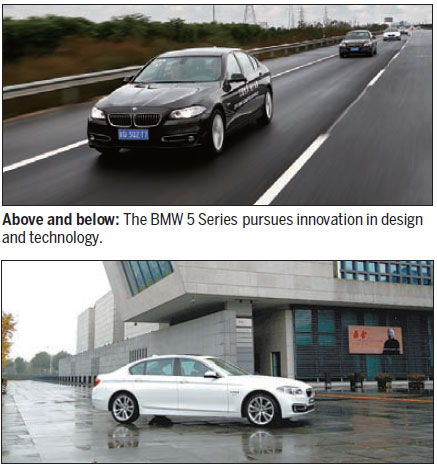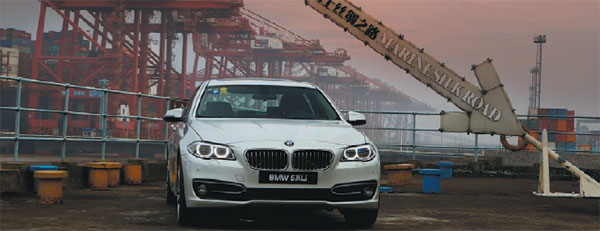ConnectedDrive supports BMW 5 Series' leading position in China
|
The BMW 5 Series ConnectedDrive test drive tours the ancient city of Ningbo, Zhejiang province. Photos Provided to China Daily |
|
From left: Participants who took part in the test drive enjoy the innovative technology and driving pleasure of the 5 Series in Ningbo. The view of ancient buildings in Ningbo. |
From January through October this year, BMW sold 126,044 units of its 5 Series in the China auto market, up 4.4 percent year-on-year. The marque is a market leader with share of 37.8 percent in the premium business vehicle segment.
The sixth-generation 5 Series has sold 500,000 units in China since it hit the market in 2010, setting a company sales record for a single series in China.
The 5 Series, a masterpiece from BMW, has presented six generations since it made its debut 44 years ago in 1972.
According to BMW, the series has won the trust of China's high-end business customers with its design, innovative technology and driving pleasure.
It accelerates the trend of "connection and intelligence" in the premium business sedan segment.
BMW believes that digitization and car networking services are vital for premium automakers. China stands in a leading position in those technologies, and domestic customers also have a passion for such technologies.
Alexis Trolin, general manager of BMW ConnectedDrive Lab China, said the lab has made great efforts to popularize its ConnectedDrive service since it was launched in China in 2012.
Thanks to continual production upgrades and innovation, the 5 Series has become an innovation leader in the segment and sales are rising.
So far, "the BMW 5 Series has become the most mature and the best-selling platform in China," Trolin said.
Themed "Connect the World, Lead the Future", the BMW 5 Series ConnectedDrive test drive 2015 event was held in the ancient city of Ningbo, Zhejiang province, from Nov 16 to 18.
The test drive in Ningbo was designed to enhance the high-end business image of the BMW 5 Series and to raise public awareness of the Connected-Drive system. The event also demonstrated the success of the 5 series as a high-end business product over the past 44 years, as well as the brand's continuous pursuit of innovation in design and technology, according to BMW. As one of the world's most successful models in the premium business sedan segment, the BMW 5 Series has always followed the concept of being a "partner of visionaries", according to the company.
BMW introduced the sales achievements of its 5 Series in China, its ConnectedDrive technology and latest developments to participants during a workshop. In addition to presenting the charms of the 5 Series, the test drive showed the beauty of Ningbo in aspects including architecture and crafts.
As a historic Chinese city, Ningbo is famed for its libraries and its ports. The city is also one of the most important ports linked by the Maritime Silk Road.
It is one of the top three trade ports in the country, along with Yangzhou and Guangzhou.
Ningbo is also the birthplace of Yongshang, or the Ningbo merchant group, who are famed in Chinese history. It is known as the cradle of the Chinese business class because of its unique business practices and culture. That is why Ningbo is the perfect location to test drive the 5 Series - its premium business sedan, BMW said.
The test drive featured the traditional business culture of Ningbo merchants, which is strongly integrated into BMW's ConnectedDrive communication, the automaker said.
The merchant group of Ningbo was the largest commercial group in modern China and promoted the development of China's industry and commerce. Businesspeople from Ningbo established the country's first bank, shipping company and machine factory.
Participants in the test drive visited several locations in Ningbo, including the Zheng family's 17 houses; Tianyi Chamber, the oldest existing library in China; Ningbo Museum; Beilun Port; and Cicheng ancient town.
The Zheng Houses, considered the largest ancient architectural complexes from the Ming and Qing dynasties (1368-1911) in China, were a birthplace of the Ningbo merchant group.
Walking beside the river surrounded by the ancient residences, one can imagine the events that occurred in the houses hundreds of years ago.
The houses display the architectural beauty of the regions south of the Yangtze River. They are surrounded by riverways, and every residence has its own water landing. A street runs through the middle of the residences, with several stores located on either side of the street.
The BMW 5 Series shares the same aesthetics and elegant design as the Zheng Houses, with its sleek and sporty body proportion provided by its long wheelbase and long hood.
Ningbo Museum displays an authoritative record of Ningbo's commercial history. Ningbo is a city that connects the river and sea and has boasted a maritime culture since ancient times. It is one of the oldest trade ports in China, and locals have done business with foreigners since the Tang Dynasty (AD 618-907).
Beilun Port - the biggest deepwater port in China - is also located in Ningbo.
The port trades with more than 600 ports in more than 100 countries and its cargo volume is the second-largest in China.
The test drive also included Cicheng Ancient Town - a famous historical and cultural town in China, to highlight the common characteristics between the traditional business culture of the Ningbo merchants and the BMW 5 Series.
In the last stop on the trip, participants visited Sun Wei, an inheritor of Yue kiln celadon making. Celadon from Yue kilns has been renowned in Asia and Africa since the beginning of the ninth century, and was one of the earliest of China's export commodities. Sun lives at Shanglin Lake, one of the major production areas for Yue kiln celadon. He explained the history of the craft and his dreams of rebuilding the glory of the thousand-year-old art.
duxiaoying1@chinadaily.com.cn

(China Daily 12/09/2015 page15)
















